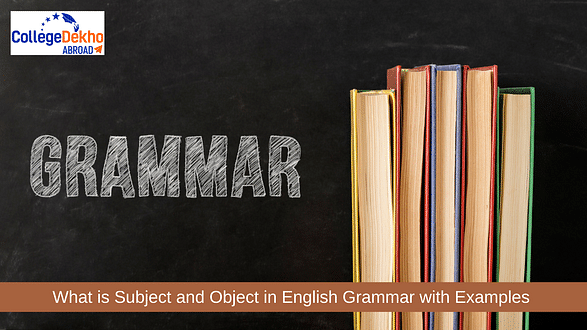What is Subject and Object in English Grammar: Preparing for the IELTS exam requires a thorough mastery of English grammar, including the notions of subjects and objects. These key parts are required in precisely structuring sentences and successfully communicating meaning. In this post, we'll dig into the realm of subjects and objects in English grammar, looking at their definitions, functions, and significance in the IELTS exam.
A solid understanding of subjects and objects will help you build grammatically correct sentences, maintain the subject-verb agreement, and understand written and spoken English more effectively, whether you are working on the writing, speaking, reading, or listening modules. Let us explore the universe of subjects and objects to discover the keys to learning English grammar for the IELTS exam.
Also Reads:
|
Common Mistakes You Must Avoid While Preparing for the IELTS Exam |
What is an Object in English Grammar?
An object in English grammar is a part of a sentence that usually comes after a verb or a preposition and either receives the verb's action or indicates the consequence of the verb's activity. Objects can be classified as direct or indirect. Let us go through these two types in further detail:
-
Direct Object: A direct object is one that gets the verb's action directly. It responds to the query "what" or "whom" that follows the verb. As an example:
-
He ate an apple. ("an apple" is the direct object)
-
Sara and Jessica went to see a movie. ("a movie" is the direct object)
-
He slammed against the chair. ("the chair" is the direct object)
-
-
Indirect Object: An indirect object gets the verb's action indirectly. It is generally used before the direct object to answer the queries "to whom" or "for whom" the action is performed. Indirect objects do not appear in all sentences. For example:
-
She handed me a gift. (In this case, the indirect object is "me," while the direct object is "a gift.")
-
She bought a car for her brother. (In this case, the indirect object is "her brother," while the direct object is "a car.")
-
Important Note: It is important to remember that not every phrase has an object. While some sentences may just have a subject and a verb, others could also include adverbs or adjectives. By identifying the receivers or outcomes of an action, objects are essential in enhancing the depth and completeness of a sentence.
Know Which Exam is Best Suited For You to Study Abroad!
What is a Subject in English Grammar?
The subject is an essential part of a sentence in English grammar. It usually signifies who or what is being mentioned in a statement or who or what conducts the activity. Typically, a noun, pronoun, or noun phrase serves as the subject. Here are some important details related to subject in English grammar:
-
Subject as the Doer of the Action: In a sentence, the subject frequently takes on the role of the performer or doer of the activity that the verb expresses. As an example:
-
John walks every morning. (“John” is the subject, and “walks” is the verb.)
-
-
Subject as the Sentence Topic: Sentence with the Subject Even when there is no action involved, the subject can nevertheless serve as a representation of the topic or idea of the phrase. For instance:
-
Music makes people happy. (“Music” is the topic subject)
-
-
Subject-Verb Agreement: A sentence's subject and verb must have the same number. A solitary verb must match a singular subject, and a plural subject must match a plural verb. For instance:
-
She sings beautifully. (Singular verb "sings" fits singular subject "She")
-
They all sing together. (The singular subject "They" corresponds to the singular verb "sing")
-
-
Position in a Sentence: In a declarative statement, the verb often comes before the subject. The subject could, however, appear after the verb in some interrogative or inverted sentence constructions. For instance:
-
The cat is sleeping. (The verb "is sleeping" comes before the subject "The cat").
-
The question "Is the cat sleeping?" (The verb "is" is followed by the subject "The cat")
-
Subject vs Object Differences
The subject and object are two important sentence components in English grammar that have different purposes. The following table is a comparison of the differences between the subject and object:
|
Points of Differences |
Subject |
Object |
|---|---|---|
|
Definition |
The subject is the person who performs the activity or the sentence's subject. Usually, it comes first, then the verb. |
The verb performs an action on the object, or the object displays the outcome of the action. Normally, it follows the verb or preposition. |
|
Function |
It carries out the action or is mentioned in a phrase. |
It either receives the action or displays the outcome. |
|
Placement |
Usually comes first in a declarative phrase before the verb. |
Comes after the preposition or verb. |
|
Questions Answered |
"Who" or "what" is performing the action or being described? |
"Whom" or "what" is receiving the action or showing the result? |
|
Examples |
She cooks delicious food. (Subject: "She") |
He gave her a book. (Indirect Object: "her," Direct Object: "a book") |
|
Agreement |
The subject and verb must agree in number (singular or plural). |
Verb agreement is unaffected by the object. |
|
Importance |
Essential for building grammatically sound phrases and identifying the action's emphasis or performer. |
Gives a phrase more depth and completeness by mentioning the receivers or outcomes of the activity. |
Note: Just keep in mind that while not all sentences contain objects, all sentences need to have a subject. Typically, the subject is the major point of interest, and the object supports the action by either accepting it or displaying the outcome.
How to Identify Subject and Object in English Sentences?
Analysing the sentence structure and knowing the purpose of each element is required to identify the subject and object in English sentences. Here are some procedures to assist you in determining the subject and object:
-
Determine the Verb: Begin by identifying the verb in the statement. The verb is the activity or state of being around which the phrase revolves.
-
Ask a Question: Before the verb, ask "Who?" or "What?" to identify the subject. The subject is most likely the solution to this query. After the verb, ask "Whom?" or "What?" to identify the object. The item is most likely the solution to this question.
-
Look for Word Order: In most basic phrases, the subject comes before the verb, whereas the object follows after the verb or preposition. However, in particular phrase patterns, like questions or passive voice formulations, word order might shift.
-
Consider Verb Agreement: In terms of number (singular or plural), the subject and verb should agree. Check to see if the verb is solitary or plural, and make sure the subject fits the verb form.
-
Differentiate Between Direct and Indirect Objects: If a verb transfers or influences something or someone, it may have both a direct and indirect object. The action is received immediately by the direct object, whereas the indirect object identifies the recipient or beneficiary. Keep in mind that not all sentences have indirect objects.
Note: You may correctly differentiate the subject and object in English sentences by following these procedures. Practising different sentence forms can improve your comprehension and skill in sentence analysis.
Importance of Subject and Object for the IELTS Exam
Understanding the importance of the subject and object in English is useful for the IELTS exam in a variety of ways:
-
Sentence Structure: Identifying the subject and object correctly helps in the construction of grammatically correct phrases. This competence is critical for earning a good score in the writing and speaking modules, as you are assessed on your ability to generate cohesive and grammatically correct replies.
-
Subject-Verb Agreement: It is necessary to recognise the topic in order to ensure subject-verb agreement. Using the right verb form that fits the subject in terms of number (singular/plural) in the IELTS exam is important for grammatical accuracy and can improve your IELTS score.
-
Comprehension: Understanding the subject and object improves your comprehension skills. Recognising the subject and object in the reading and listening modules helps you comprehend the primary concept and relationships inside a sentence or paragraph, allowing you to answer questions correctly.
-
Sentence Transformation: You may be asked to change sentences from one form to another in the IELTS test (for example, from active to passive voice). Identifying the subject and object is compulsory for such activities since it decides how to adjust the sentence structure and verb forms.
-
Vocabulary and Context: Understanding the meaning and context of a sentence is assisted by recognising the subject and object. This information aids your comprehension of the passage in the reading module and your interpretation of the meaning of spoken or written text in the hearing module.
Finally, knowing the roles and significance of subjects and objects in English grammar is important for IELTS achievement. Identifying the subject and object correctly aids in the construction of grammatically correct sentences, guaranteeing subject-verb agreement, and boosting comprehension abilities. Test takers can demonstrate their language ability and improve their overall performance in the IELTS exam by grasping the concepts of topics and objects. So, understand the importance of subjects and objects, practice identifying them, and excel at creating well-formed sentences that properly express meaning.
Reach out to our study abroad counsellors and write your queries at abroad@collegedekho.com!
Want to Know What IELTS Score is Required by Your University?

























